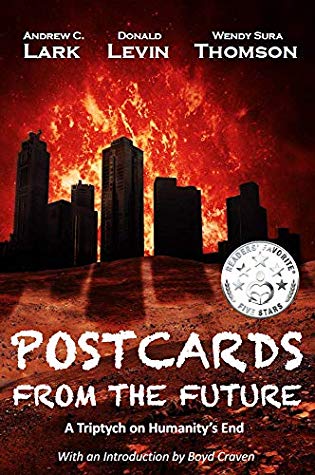 Find This Book On Amazon Find This Book On Amazon This was an interesting project undertaken by three author friends. They decided to collaborate on an anthology, which would take two of them into a writing world they’d not explored before. Andrew wrote a podcast script in their chosen style previously, and the idea for this project came at his suggestion. They didn’t go into the process with any mandates or outlines aside from focusing on the dystopian genre, and a target of 20,000 - 25,000 words. The end result is a trilogy of stories that are very different; and yet, interestingly enough, hold a key similarity. Andrew’s tale, “Pollen”, is presented as a collection of journal entries, letters, and “official documents” that tell of a strange illness that has overtaken all of humanity, and eventually leads to its extinction. The concept is an ambitious one, and I give the author tremendous credit for the concept. However, I was disappointed that the pieces seemed to be disconnected from one another. Although the accounts were all dated, I lost the flow of continuity and a real sense of chronology. The collection of narratives felt more like stumbling upon a haphazard folder of newspaper clippings without the advantage of a reporter to glue in the transitions. The weight of the individual entries was lost on me because I didn’t feel there was a “cork board” narrative to pin them all together. I would have enjoyed the story more if I’d had a greater sense of rolling tension and a more connected ending; a skill Andrew demonstrates strongly with his dystopian podcasts in his “Dark Waters” series. Donald’s story, “The Bright and Darkened Lands of the Earth” was a distinctively different account of life after devastation. Mired in the fallout from the atrocities of society past, a matriarchal community seeks answers to their future in a language nearly lost, and the dangers of men. I was wholly engaged from the first page. What Donald does with language… the use of words, their weight, and the importance of understanding… is brilliant. The reader learns about the characters and customs of this community not so much through the description of actions and settings, but through their choice of words, how those words are presented… and their lack of words. In fact, emotion runs high, and we identify with the characters on a more visceral level simply because the dialogue is sparse, and in some cases, stilted. I was disappointed at the end of the story; not because it was poorly written, but because I wanted to spend more time in that world. I am pleased to learn from a conversation with Donald, that he will indeed be writing more about this world, and spending time with these characters. I look forward to the next installment. Wendy’s piece, “Silo Six”, told of a far future post apocalyptic world where technology has stunted individualism, creativity, and true connectivity of community. The characters show us a world that has lost itself in the mundane repetition of hundreds of years of a focus on survival, rather than quality of life. The story line is easy to follow, the settings are easy to visualize, but I felt the story lacked depth. The scene descriptions lacked imagination. I felt like I was reading a scientific report, rather than the direct experience of the main character’s lives. Their days read like an itinerary, their emotional connections felt forced, and the dialogue felt far too scripted and unnatural. My experience reading this story was that it was far too much tell and not enough show and almost no feel. I was left dangling, as if I’d experienced a documentary rather than a creatively emotional story. All that being said, what I found quite fascinating about these three novellas is that without the three authors consulting each other on the formula they would use or the plot devices they invoked as they wrote their stories, they made the connection anyway, perhaps subliminally. Each story’s underlying focus was on a book of some sort. In Andrew’s piece, the focus was a notebook, pieced together by “the last survivor” and left behind after his death. In Donald’s story, a book was the coveted talisman the characters sought to bring them enlightenment, even though most had no idea what a book looked like, or even how to read. Wendy’s main character was lost in the library. She cherished the stories told in “ancient” books as a way to romanticize her life, a life that was so bland that she needed to discover creativity in the old pages. I’ve said before that I am an ardent fan of novels that focus on books, libraries, and language. This one concept was the singularity that glued the trilogy together for me. Books are the connective tissue that binds this anthology, and the incentive that kept me turning the pages. I felt that although each story was a segment on its own, this “mistake of creativity” is the strongest reason I have for recommending the collection. As pieces, they invoked very different, emotional and intellectual responses. As a whole project, I felt as though I may have been led through the same forest by three very distinct manifestations of creativity. And so, my curiosity is piqued to ask, might this trio of authors add tendons to the tissue, and perhaps create another anthology, taking the concept toward another stage of life? I suppose I’ll have to wait and see what this trio creates next. Watch an interview with each of these authors as they discuss their writing careers on the Indie Reads TV program. Andrew Charles Lark Donald Levin Wendy Sura Thomson
0 Comments
Leave a Reply. |
WelcomeYou'll find some interesting stuff here... some Op Eds, some Information, Book Reviews, and More. Poke around the categories and see what ruffles your feathers... in a good way! Archives
July 2024
Categories
All
|
 RSS Feed
RSS Feed